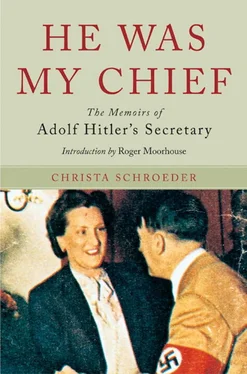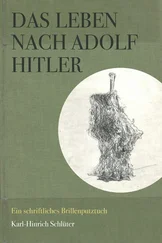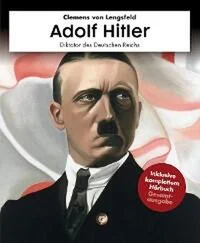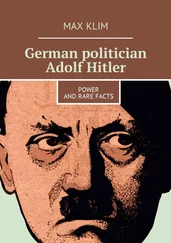Christa Schroeder - He Was My Chief - The Memoirs of Adolf Hitler's Secretary
Здесь есть возможность читать онлайн «Christa Schroeder - He Was My Chief - The Memoirs of Adolf Hitler's Secretary» весь текст электронной книги совершенно бесплатно (целиком полную версию без сокращений). В некоторых случаях можно слушать аудио, скачать через торрент в формате fb2 и присутствует краткое содержание. Город: Barnsley, Год выпуска: 2012, ISBN: 2012, Издательство: Frontline Books, Жанр: История, Биографии и Мемуары, на английском языке. Описание произведения, (предисловие) а так же отзывы посетителей доступны на портале библиотеки ЛибКат.
- Название:He Was My Chief: The Memoirs of Adolf Hitler's Secretary
- Автор:
- Издательство:Frontline Books
- Жанр:
- Год:2012
- Город:Barnsley
- ISBN:978-1-7830-3064-4
- Рейтинг книги:4 / 5. Голосов: 1
-
Избранное:Добавить в избранное
- Отзывы:
-
Ваша оценка:
- 80
- 1
- 2
- 3
- 4
- 5
He Was My Chief: The Memoirs of Adolf Hitler's Secretary: краткое содержание, описание и аннотация
Предлагаем к чтению аннотацию, описание, краткое содержание или предисловие (зависит от того, что написал сам автор книги «He Was My Chief: The Memoirs of Adolf Hitler's Secretary»). Если вы не нашли необходимую информацию о книге — напишите в комментариях, мы постараемся отыскать её.
He Was My Chief: The Memoirs of Adolf Hitler's Secretary — читать онлайн бесплатно полную книгу (весь текст) целиком
Ниже представлен текст книги, разбитый по страницам. Система сохранения места последней прочитанной страницы, позволяет с удобством читать онлайн бесплатно книгу «He Was My Chief: The Memoirs of Adolf Hitler's Secretary», без необходимости каждый раз заново искать на чём Вы остановились. Поставьте закладку, и сможете в любой момент перейти на страницу, на которой закончили чтение.
Интервал:
Закладка:
After the collapse of the Third Reich Frau Schroeder was arrested by the US Army Counter-Intelligence Corps (CIC) on 28 May 1945 at Hintersee near Berchtesgaden and interned at various camps and prisons by the occupying Powers. On 13 February 1947 the judicial tribunal of Internment Camp 77 at Ludwigsburg served an arrest order on Frau Schroeder and she was brought before the tribunal for a preliminary hearing next day.
On 24 October 1947 she was accused of being a Group 1 Hauptschuldige , a war criminal of the principal group. The indictment specified that Frau Schroeder had been Hitler’s shorthand typist and had received from him a gold badge for efficient service. Nothing else was alleged. At the full hearing on 8 December 1947 she was convicted of being a Group 1 major war criminal on the facts cited in the specification and was sentenced to three years’ labour camp, to the forfeiture of all her goods and possessions (5,000 marks) and that ‘the consequences of Article 15 are to apply for the next ten years.’
On 20 April 1948 the Ministry for Political Freedom of Württemberg-Baden overturned this verdict on the grounds that ‘the classification of the accused as a major war criminal is based upon an error in law’, and referred the matter back to the tribunal. On 7 May 1948 after the review hearing it was held that:
…the accused can under no circumstances be considered a Group 1 war criminal… from the beginning to the end she was employed as a shorthand typist. Her work was wholly mechanical, she lacked any kind of independent organized authority and at best can only have exercised the least possible influence on the direction of events. She was highly paid only for her outstanding talent and great competence as a shorthand typist. As regards her obligation to expiate her activity, it is taken into consideration that she was bombed out of her home and is penniless, has already spent a long period in custody and has thus expiated sufficiently.
Frau Schroeder was reclassified as a Group IV Mitläuferin (collaborator) and released from detention at Ludwigsburg on 12 May 1948. She concluded: ‘Whether my guilt was as great as my expiation is something I do not know to this day.’
In civilian life from 1 August 1948 until 1 November 1958 she worked as a private secretary to Herr Schenk, the owner of a light metal works at Schwäbisch Gmünd and then at its Maulbrunn main plant until 31 October 1959 after which, as in 1930, she returned to Munich. There she accepted employment on 1 November 1959 with a property insurer in a managerial capacity. On 26 June 1967 at age 59 and in ailing health she retired and lived a secluded life in Munich until her death on 28 June 1984.
It is interesting to observe how Frau Schroeder saw herself in the last years of her life. In a memorandum ‘About Myself’ she wrote:
I am attentive, judgmental, critical, willing to help. I have the ability to rapidly size up a situation, and the gift of intuition. From a person’s face and mannerisms I am able to read much about his character. I seldom find a person to be nice. If I do, however, then I jump across all barriers. Unfortunately! My capacity for criticism is coupled to an irresistible urge for truth and independence. I despise people who are self-important, who need to dominate others, who have no opinions of their own but adopt the views of others. I despise people who are materialist, who are conventional, who lie, who prejudge and are never prepared to reflect upon everything which has led to this point.
During her time as Hitler’s secretary Christa Schroeder never knew a private life◦– the life a young woman imagines for herself. After a less than enjoyable youth, she never was to find the tranquillity of existence a woman would wish for. This tragic aspect of her life probably left its mark on her.
In 1938, Frau Schroeder became engaged to Yugoslav diplomat Lav Alkonic although she knew that this could have consequences with Hitler who would never have given his blessing to such a liaison. At the beginning of 1939 she asked Hitler: ‘Mein Führer, how would you feel if one of your secretaries wanted to marry a Yugoslav?’ Hitler answered: ‘There would be no question of it.’ Frau Schroeder then suggested that the secretary could leave the employment to which Hitler replied: ‘I would know how to prevent that.’
Alkonic had contacts within Yugoslav officers’ circles and was later involved in shady business dealings in Belgrade. After references to his ‘contact in the Reich Chancellery in Berlin’ the Gestapo took an interest and interrogated Frau Schroeder. She described the situation in a letter from the Berghof to her friend Johanna Nusser [8] Johanna Nusser was a long-term friend of Frau Schroeder with whom she maintained an intimate correspondence during the war. She spoke on her behalf at the war crimes tribunal hearing and helped Frau Schroeder after her release in 1948. In the 1950s Frau Nusser returned a batch of letters written to her by Schroeder during the war and allowed her to pass another batch to the historian David Irving. The latter are now at the Institut für Zeitgeschichte.
on 22 February 1941. Frau Schroeder stated that the ‘suspicion’ had arisen following the interception by the Vienna censor of a letter from a certain Djuksic, and she had seen no alternative but to tell the Gestapo the truth.
As a result of the foregoing we cannot write to him again◦– at least not until the war is over. Consul-General von Neuhausen of Belgrade, whom I met in the former Rothschild Palace at the invitation of General Hanesse, gave me this advice. Neuhausen did not think much of Lav, he had been involved in some dubious business affairs which had not been very fair. He also believed that Lav was working with the Yugoslav General Staff. ‘You understand what I mean by that, don’t you?’ he said. The Gestapo man then interposed that Lav was mentioning his ‘contact in the Reich Chancellery’ when calling on German firms. How much truth there is in that is hard to tell. In any case, I said, one shouldn’t take it too seriously, everybody does it. I hope the OKW is satisfied with my statement, I wouldn’t want them to go delving any further into the matter.
The engagement was broken off in 1941.
It may be interjected here that there was also no fulfilment in life for the 55 million or so victims of the Second World War, for the people in the prisons and concentrations camps of the Nazi system: and that these people suffered more than a secretary of Hitler. As an individual human fate, however, one cannot avoid seeing that for Frau Schroeder the years alongside Hitler were years lost, that in her heart she was never happy to be there, and her health was seriously affected by living in damp and musty bunker rooms at FHQ and later in Allied internment. But certainly it was just one fate amongst millions of others.
Life for Christa Schroeder in proximity to Hitler was marked by the need for her constant presence and compliance with the regulations for State protocol laid down by Hitler. Only limited areas of free movement existed in the Reich Chancellery, at the Berghof or in the various FHQs. She saw continuously the same people and the same faces of the entourage with whom she was obliged to coexist day in, day out, within the enclosure of the FHQ◦– described by Generaloberst Jodl [9] Generaloberst der Artillerie Alfred Jodl (b. 10.5.1890 Würzburg, d. 16.10.1946 executed Spandau). From 23.8.1939 Chief of Wehrmacht Policy Office (later Wehrmacht Policy Staff) at FHQ. As Hitler’s chief of staff advised him on tactical and strategic matters; 7.5.1945 Wehrmacht signatory to partial capitulation to Western Allies, Rheims; interned 23.5.1945 Mürwik; 30.9.1946 sentenced to death as war criminal.
at Nuremberg postwar as ‘a cross between a monastery and a concentration camp’.
Интервал:
Закладка:
Похожие книги на «He Was My Chief: The Memoirs of Adolf Hitler's Secretary»
Представляем Вашему вниманию похожие книги на «He Was My Chief: The Memoirs of Adolf Hitler's Secretary» списком для выбора. Мы отобрали схожую по названию и смыслу литературу в надежде предоставить читателям больше вариантов отыскать новые, интересные, ещё непрочитанные произведения.
Обсуждение, отзывы о книге «He Was My Chief: The Memoirs of Adolf Hitler's Secretary» и просто собственные мнения читателей. Оставьте ваши комментарии, напишите, что Вы думаете о произведении, его смысле или главных героях. Укажите что конкретно понравилось, а что нет, и почему Вы так считаете.












